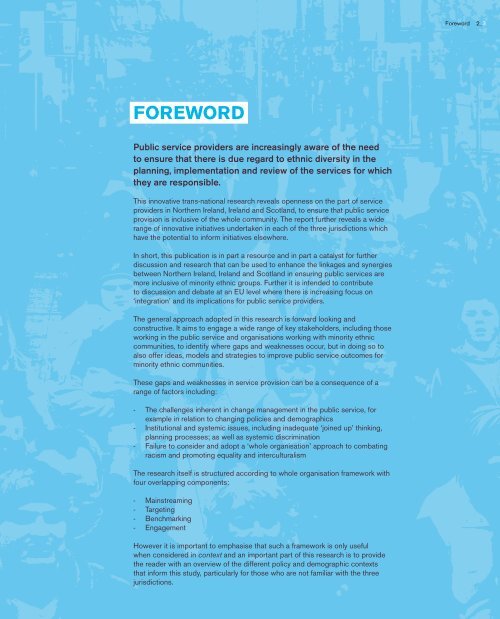improving government service delivery to minority ethnic ... - NCCRI
improving government service delivery to minority ethnic ... - NCCRI
improving government service delivery to minority ethnic ... - NCCRI
Create successful ePaper yourself
Turn your PDF publications into a flip-book with our unique Google optimized e-Paper software.
Foreword<br />
2_<br />
foreword<br />
Public <strong>service</strong> providers are increasingly aware of the need<br />
<strong>to</strong> ensure that there is due regard <strong>to</strong> <strong>ethnic</strong> diversity in the<br />
planning, implementation and review of the <strong>service</strong>s for which<br />
they are responsible.<br />
This innovative trans-national research reveals openness on the part of <strong>service</strong><br />
providers in Northern Ireland, Ireland and Scotland, <strong>to</strong> ensure that public <strong>service</strong><br />
provision is inclusive of the whole community. The report further reveals a wide<br />
range of innovative initiatives undertaken in each of the three jurisdictions which<br />
have the potential <strong>to</strong> inform initiatives elsewhere.<br />
In short, this publication is in part a resource and in part a catalyst for further<br />
discussion and research that can be used <strong>to</strong> enhance the linkages and synergies<br />
between Northern Ireland, Ireland and Scotland in ensuring public <strong>service</strong>s are<br />
more inclusive of <strong>minority</strong> <strong>ethnic</strong> groups. Further it is intended <strong>to</strong> contribute<br />
<strong>to</strong> discussion and debate at an EU level where there is increasing focus on<br />
‘integration’ and its implications for public <strong>service</strong> providers.<br />
The general approach adopted in this research is forward looking and<br />
constructive. It aims <strong>to</strong> engage a wide range of key stakeholders, including those<br />
working in the public <strong>service</strong> and organisations working with <strong>minority</strong> <strong>ethnic</strong><br />
communities, <strong>to</strong> identify where gaps and weaknesses occur, but in doing so <strong>to</strong><br />
also offer ideas, models and strategies <strong>to</strong> improve public <strong>service</strong> outcomes for<br />
<strong>minority</strong> <strong>ethnic</strong> communities.<br />
These gaps and weaknesses in <strong>service</strong> provision can be a consequence of a<br />
range of fac<strong>to</strong>rs including:<br />
-<br />
-<br />
-<br />
The challenges inherent in change management in the public <strong>service</strong>, for<br />
example in relation <strong>to</strong> changing policies and demographics<br />
Institutional and systemic issues, including inadequate ‘joined up’ thinking,<br />
planning processes; as well as systemic discrimination<br />
Failure <strong>to</strong> consider and adopt a ‘whole organisation’ approach <strong>to</strong> combating<br />
racism and promoting equality and interculturalism<br />
The research itself is structured according <strong>to</strong> whole organisation framework with<br />
four overlapping components:<br />
-<br />
-<br />
-<br />
-<br />
Mainstreaming<br />
Targeting<br />
Benchmarking<br />
Engagement<br />
However it is important <strong>to</strong> emphasise that such a framework is only useful<br />
when considered in context and an important part of this research is <strong>to</strong> provide<br />
the reader with an overview of the different policy and demographic contexts<br />
that inform this study, particularly for those who are not familiar with the three<br />
jurisdictions.
















